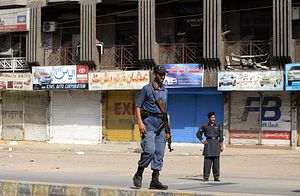There was a time, not long ago, when the Pakistani Taliban and its murderous allies were waging a brutal and relentless war on the Pakistani state.
For a period between 2007 and 2015, militants assaulted military bases across the country, from Karachi to Peshawar to Quetta. They attacked police academies and courthouses. They even hit the Army’s general headquarters building. As these terrorists staged brazen prison breaks, gunned down liberal politicians campaigning for election, and beheaded captured soldiers, the state sometimes appeared helpless in the face of this relentless onslaught of violence.
Fortunately, those days are over. In June 2014, the Pakistan Army stormed into the tribal areas in North Waziristan to take out Pakistani Taliban sanctuaries. Two years later, anti-state terrorists in Pakistan have been reduced to shadows of their former selves, and no longer boast the capacity to unleash repeated assaults against highly secured state targets. On the whole, terrorist violence levels are down significantly in the country.
Unfortunately, however, in Pakistan, terrorists aren’t going away anytime soon. They’re merely adapting to new circumstances and changing their tactics. Today, militancy has reappeared in a new guise—one that focuses less on key organs of power, and more on vulnerable people and groups.
In effect, anti-state terror campaigns have weakened, but anti-society militancy is gaining steam. Last Wednesday’s deadly attack on Amjad Sabri, a renowned and revered Qawwali singer, is the latest tragic reminder. Sabri, whose music reflected a Sufi tradition steeped in peace and tolerance, was gunned down in his car in broad daylight on a busy Karachi thoroughfare.
In the weeks preceding the murder of Sabri, Pakistani society had been rocked by multiple assaults. The bloodiest—an attack on a Lahore park and another on a university in the country’s northwest—generated the most headlines. Yet there have also been attacks on religious minorities and human rights activists.
These society-focused attacks, which have convulsed Pakistan for years, are taking center stage as the state-focused ones recede. And don’t count on them tapering off anytime soon. The terrorists’ compromised capacities make soft targets all the more tantalizing, and an increasingly radicalized society provides space for these militants to operate. In Pakistan, the state deserves blame for sponsoring some terrorists, but it is society that spawns and sustains them. The basic ideology of anti-society militancy—marked by a hatred of religious minorities and anyone who, like Sabri, espouses peace and tolerance—finds resonance in a society where these same toxic ideas are spouted by mullahs, media personalities, school textbooks, and other key opinion-shapers and information-multipliers. In effect, in Pakistan, society—like the state—is both enabler and victim of terrorism.
Hold on, one might say. Isn’t it a sign of progress that terrorists have become sufficiently weakened that they’re reduced to carrying out cowardly, one-off attacks on soft targets?
Yes, to an extent. Ultimately, however, the trend lines portend peril more than progress. The Pakistani Taliban is down but not out; it claimed responsibility for Sabri’s murder, and has, along with its offshoots, carried out mass attacks in recent months. Additionally, it can turn to powerful militant allies—including Lashkar-e-Jhangvi, Pakistan’s most feared sectarian-focused terror group—to help it wage its war on society.
Anti-society militancy in Pakistan is driven by two core objectives: first, hitting people randomly in places like parks, markets, and schools, where they should feel most safe, and, second, targeting specific types of people and groups, from Shia doctors to rights activists, whose beliefs clash most violently with the terrorists’ warped worldview. Both objectives, if achieved over time, can have chilling consequences for the general population. One is heightened fear, with no one feeling safe. Another is demoralization, given that so many terror victims are children. Still another is the slow but steady elimination of Pakistan’s rapidly shrinking bastions and embodiments of tolerance and progressive thought—not to mention an intensified war on already-vulnerable religious minorities.
If there is a silver lining here, it can be found in the large numbers of Pakistanis that turned out for Sabri’s funeral. Sadly, in Pakistan, anti-society militancy—which tends to target ordinary Shias, Ahmadis, and other religious minorities—often sparks little reaction. Sabri, however, was a cultural icon.
Still, with radicalization’s tentacles extending far across a society that is also deeply fractured, we shouldn’t expect a mass protest campaign against militancy anytime soon.
And we can’t count on the state doing much either. The military’s counterterrorism focus is on killing terrorists, not deradicalizing society. The government, which should be taking the lead on tackling anti-society militancy, is hopelessly distracted—embroiled in deep crisis since the Panama Papers implicated several members of Prime Minister Nawaz Sharif’s family in off-shore dealings.
Ultimately, one can only hope for so much from a Pakistani state that provides sanctuaries and other support to terrorists. Tellingly, just days before Sabri’s murder, the provincial government of Khyber Pakhtunkhwa announced it was providing $3 million to a hardline Islamist seminary that reportedly counts Afghan Taliban founder Mullah Omar and Haqqani Network leader Jalaluddin Haqqani among its alumni.
Thankfully, Pakistan is no longer a state under siege. But it is a society under siege. The threat posed by this new normal may be less deadly and visible, yet considerably more insidious and no less dangerous.

































